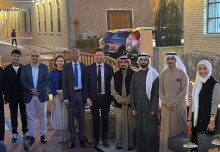

Imperial marks 100th birthday with visit from Queen and Duke of Edinburgh - <em>News Release</em>
Under strict embargo for:
00.01 BST
Monday 9 July 2007
The Centenary of the foundation of Imperial College London is celebrated today (9 July) with a ceremony in the presence of Her Majesty The Queen and His Royal Highness The Duke of Edinburgh.
The Queen and Duke will open the College's new Institute of Biomedical Engineering before taking part in an honorary graduation ceremony that celebrates both the Centenary and Imperial's independence from the University of London.
Today's visit cements a long-standing relationship between the UK Royal Family and Imperial College. The College stands on land purchased with the profits of the Great Exhibition of 1851 in fulfilment of Prince Albert's vision for a centre of science and culture in South Kensington. Imperial's Rector Sir Richard Sykes says:
"It's thanks to Albert's determination that we are celebrating our 100th birthday today, so it's a great honour and very fitting that his descendents have agreed to join us, especially as they both continue his efforts to promote UK science and industry."
Today's royal visit is a high point in a year of Centenary events that celebrate Imperial's ongoing commitment to research that improves quality of life worldwide. Current focuses include tackling and mitigating the effects of climate change, developing clean and sustainable energies, and modelling the potential spread of infectious diseases such as avian flu to minimise the effects of an outbreak. Sir Richard adds:
"One of Imperial’s strengths has been its ability to change and respond to the challenges of the times. The future holds greater challenges still, but I have no doubt that Imperial is equal to them. What we do here today, the world will rely on tomorrow."
Achievements of Imperial researchers over the past 100 years include the discovery of penicillin, the development of the holographic method and the design of the Maglev railway. Amongst more recent breakthroughs are the demonstration of the world's first 'invisibility cloak' by Sir John Pendry and the development of anti-TNF drugs by Professors Sir Ravinder Maini and Marc Feldmann , which have improved the lives of thousands of rheumatoid arthritis sufferers worldwide.
The Duke of Edinburgh will today be amongst five distinguished honorary graduates who will receive the first Imperial College degrees after The Queen bestows upon the College its new Royal Charter.
The royal party is joined by Her Highness Sheikha Mozah Bint Nasser Al-Missned of Qatar, who will also accept an honorary degree. Other honorary graduates are philanthropists Dame Vivien Duffield and Lily Safra, and Taiwanese business leader Winston Wong, who is a physics alumnus of Imperial and a Visiting Professor in the College's Institute of Biomedical Engineering.
More information on Imperial's Centenary is available at www.imperial.ac.uk/centenary
-ends-
For further information contact:
Abigail Smith
Imperial College London Press Office
Tel: 020 7594 6701
Email: abigail.smith@imperial.ac.uk
About Imperial College London
Imperial College London - rated as the world’s ninth best university in the 2006 Times Higher Education Supplement University Rankings - is a science-based institution with a reputation for excellence in teaching and research that attracts 11,500 students and 6,000 staff of the highest international quality.
Innovative research at the College explores the interface between science, medicine, engineering and management and delivers practical solutions that improve quality of life and the environment - underpinned by a dynamic enterprise culture.
With 66 Fellows of the Royal Society among our current academic staff and distinguished past members of the College including 14 Nobel Laureates and two Fields Medallists, Imperial's contribution to society has been immense. Inventions and innovations include the discovery of penicillin, the development of holography and the foundations of fibre optics. This commitment to the application of our research for the benefit of all continues today with current focuses including interdisciplinary collaborations to tackle climate change and mathematical modelling to predict and control the spread of infectious diseases.
The College's 100 years of living science will be celebrated throughout 2007 with a range of events to mark the Centenary of the signing of Imperial's founding charter on 8 July 1907.
Visit Imperial at www.imperial.ac.uk
Article text (excluding photos or graphics) available under an Attribution-NonCommercial-ShareAlike Creative Commons license.
Photos and graphics subject to third party copyright used with permission or © Imperial College London.





